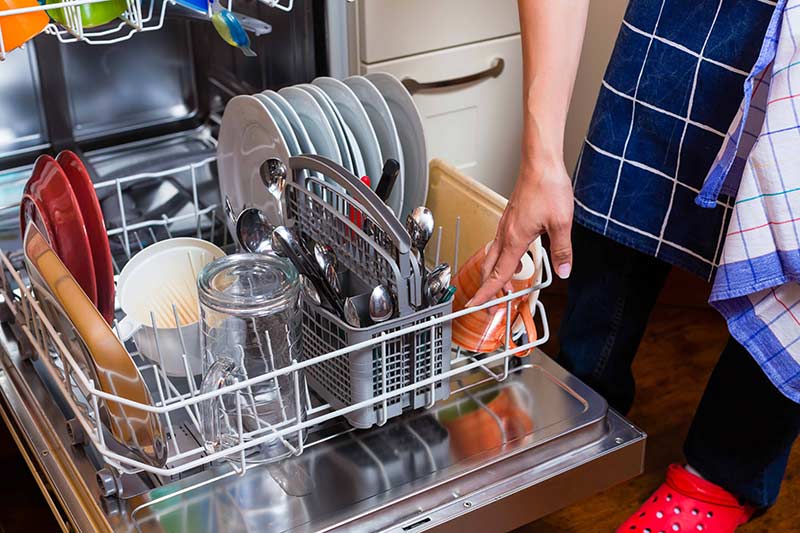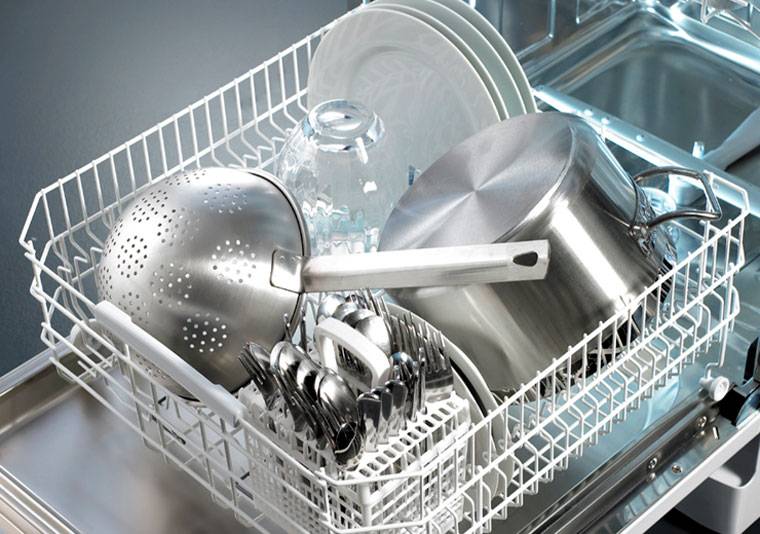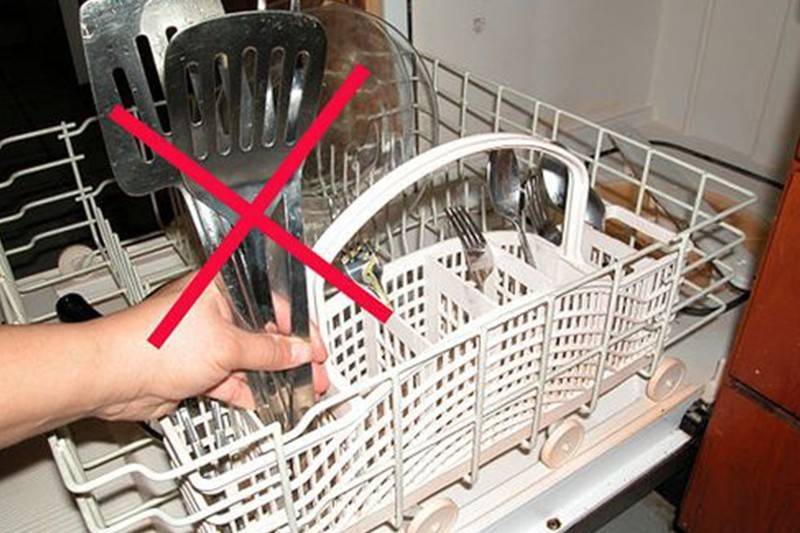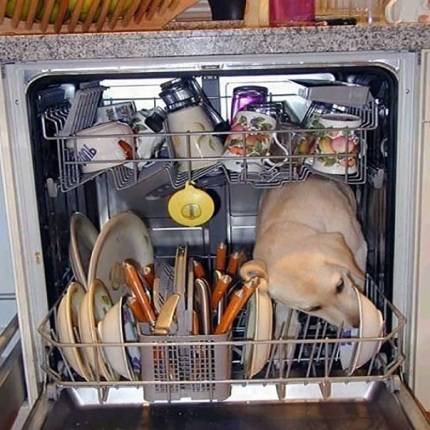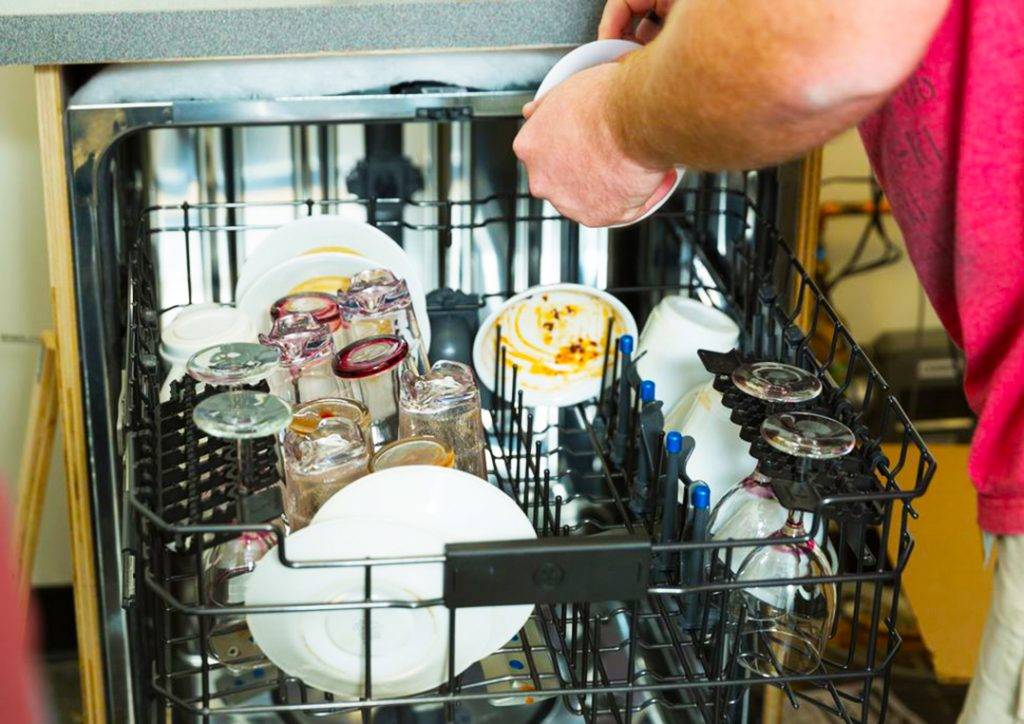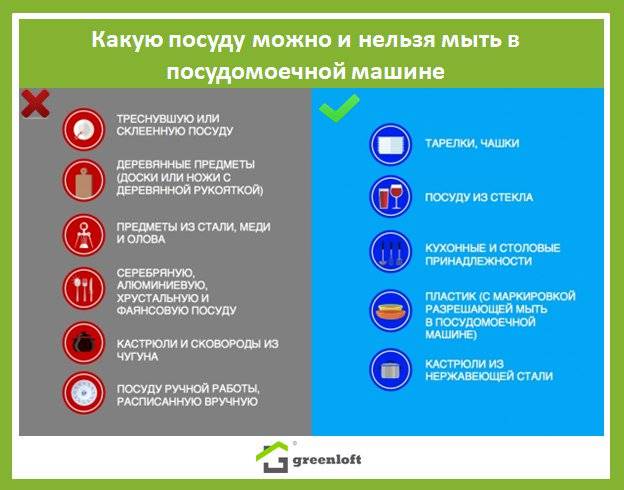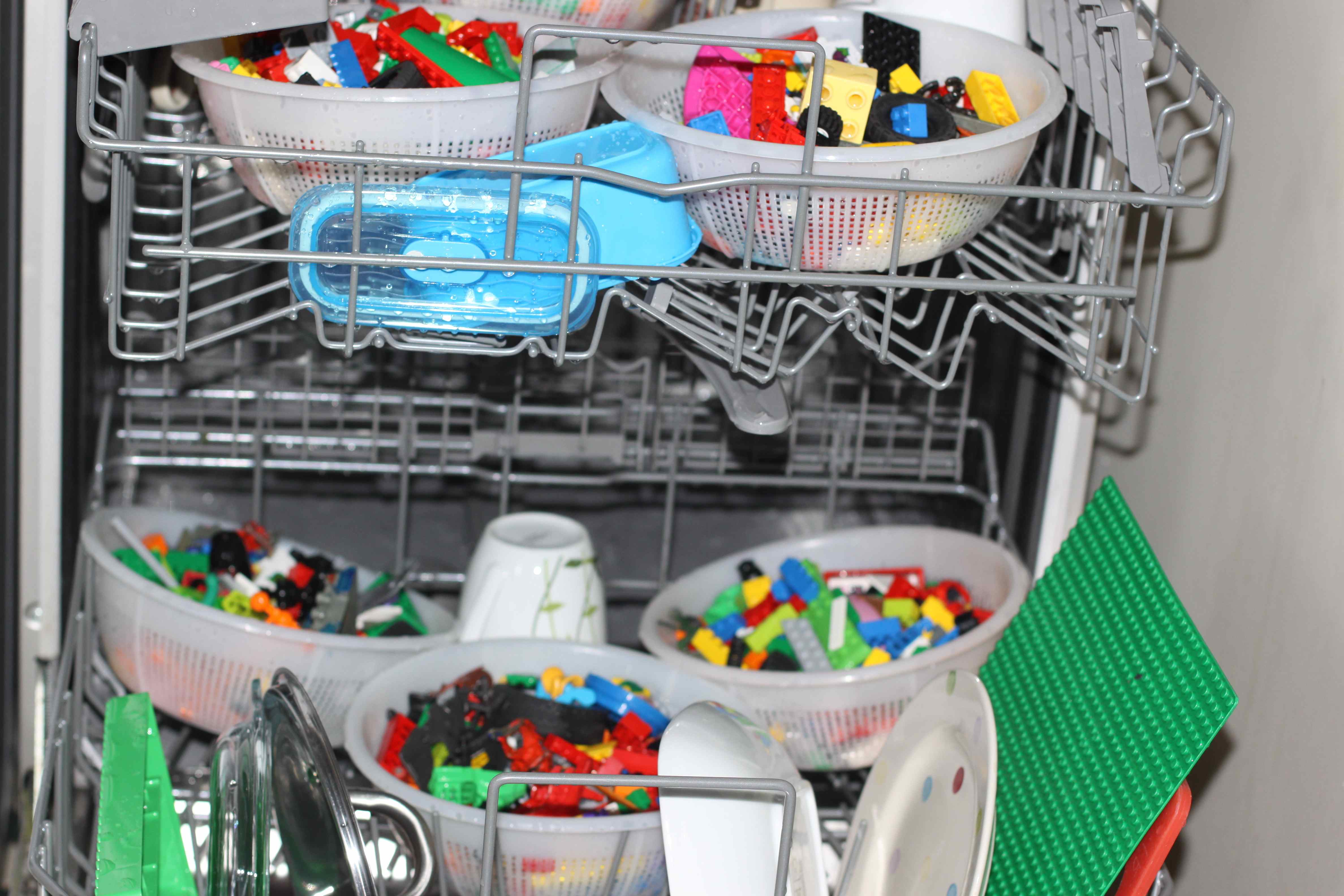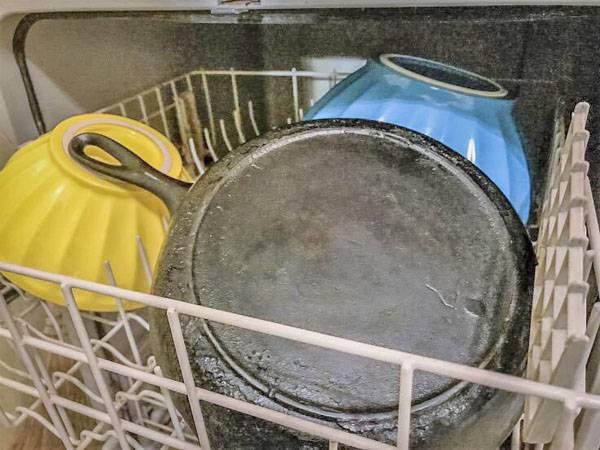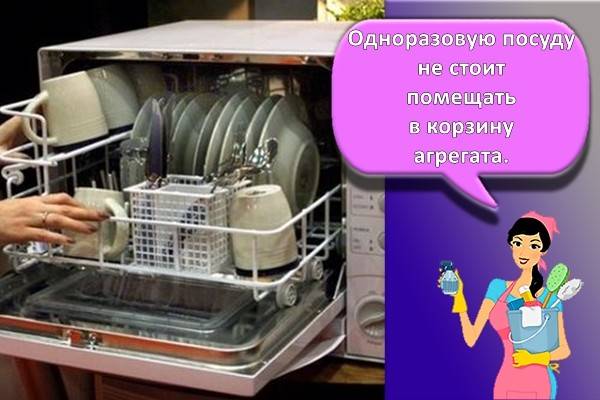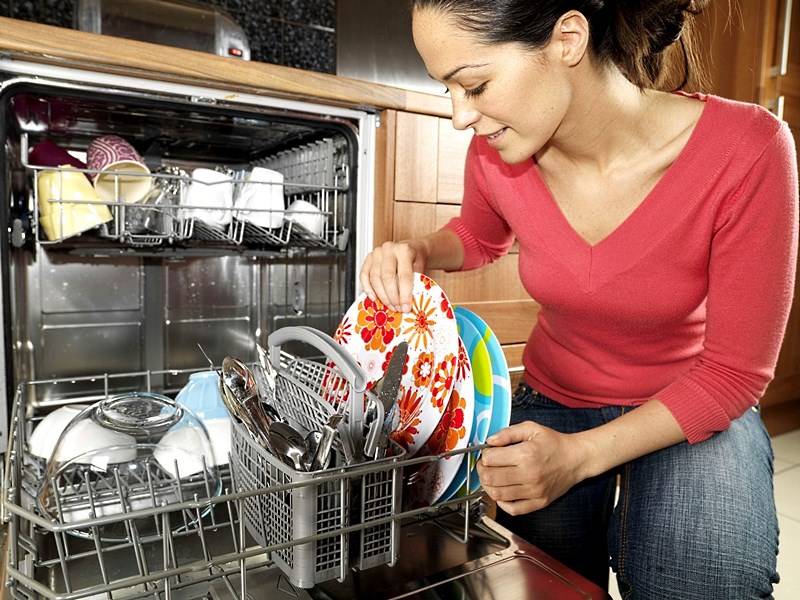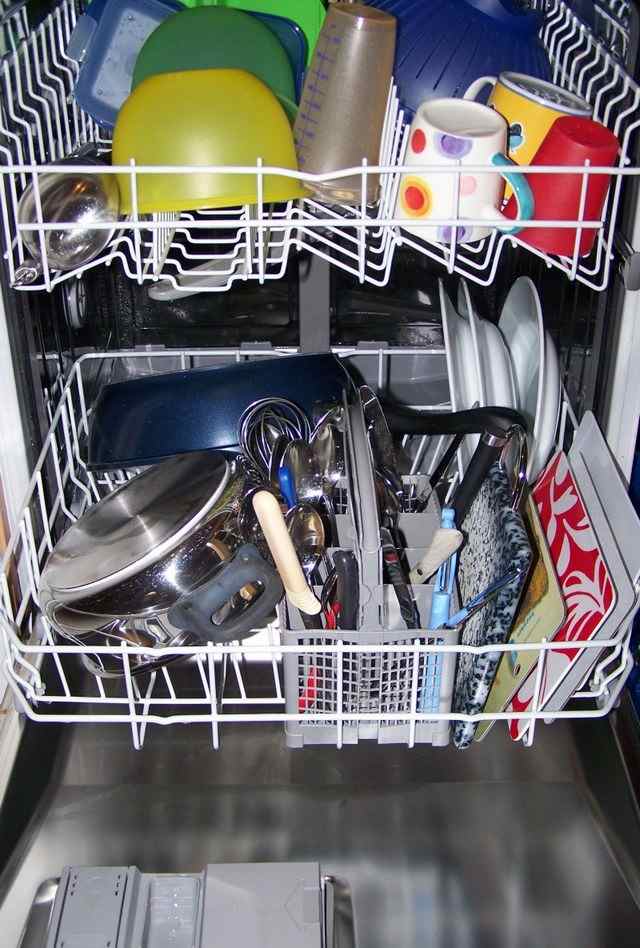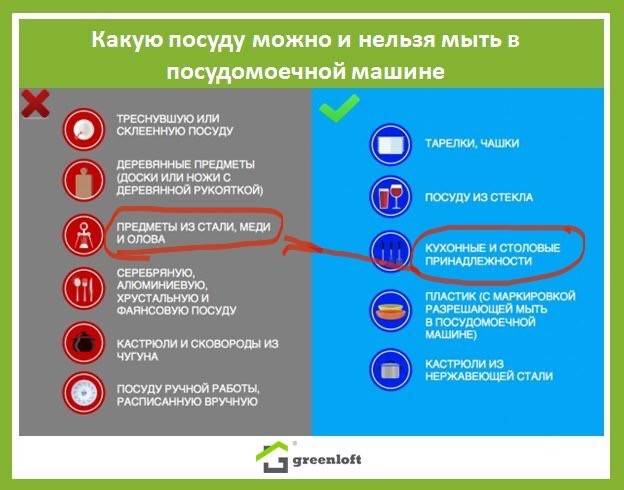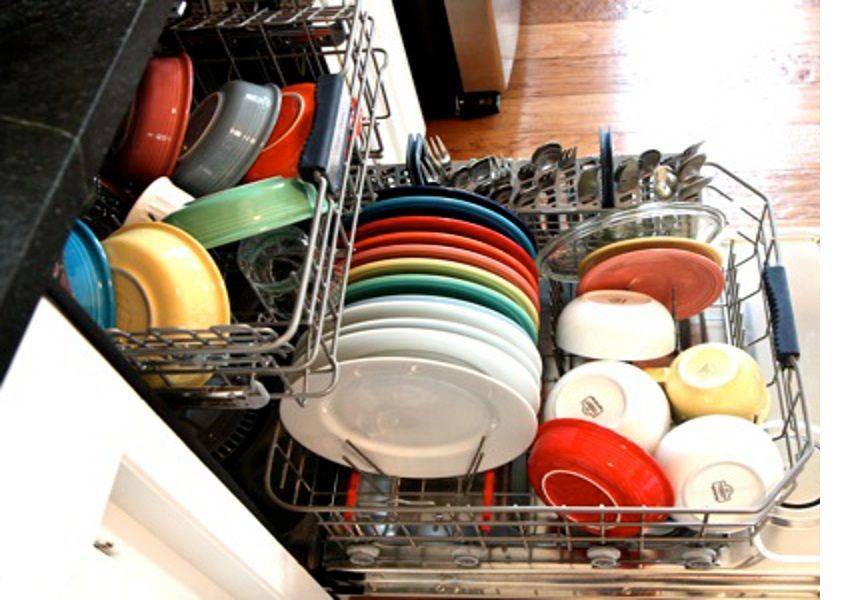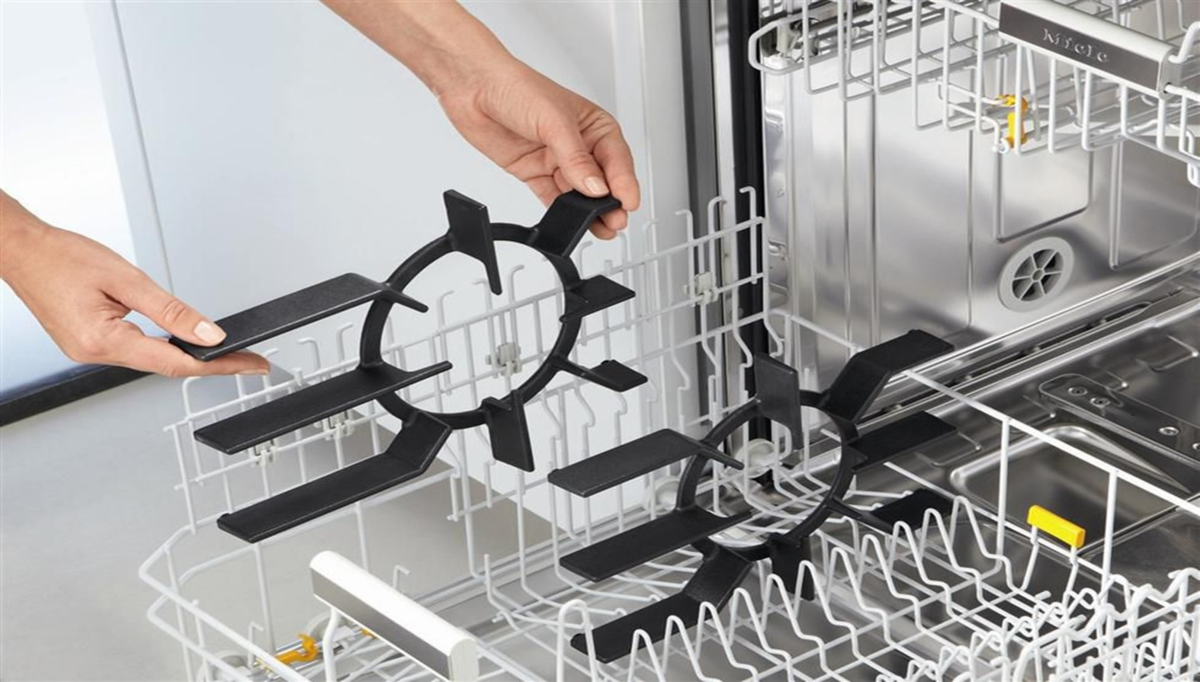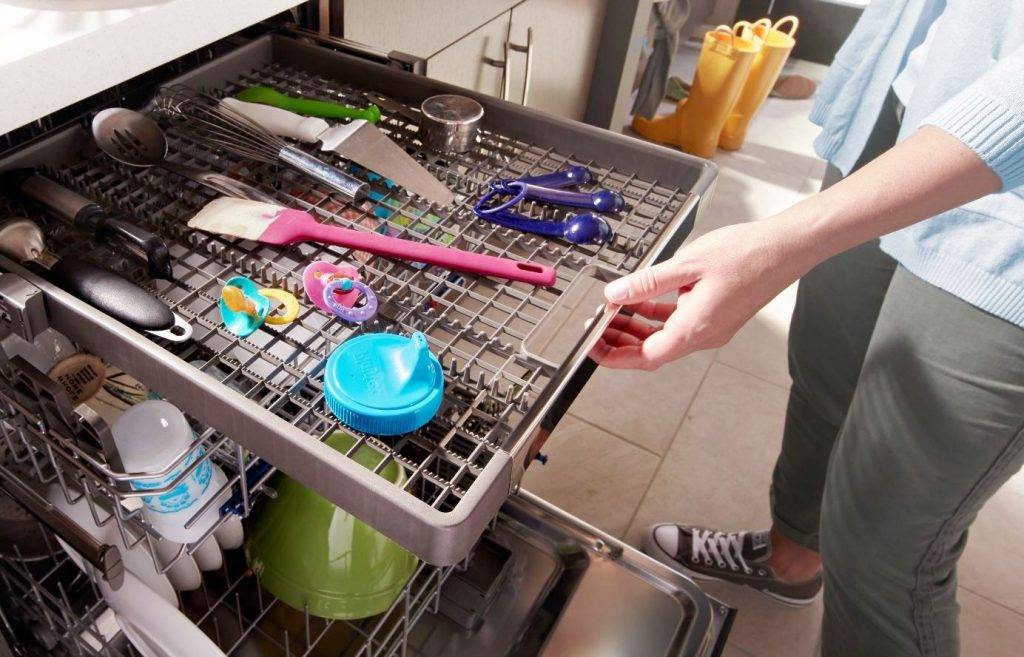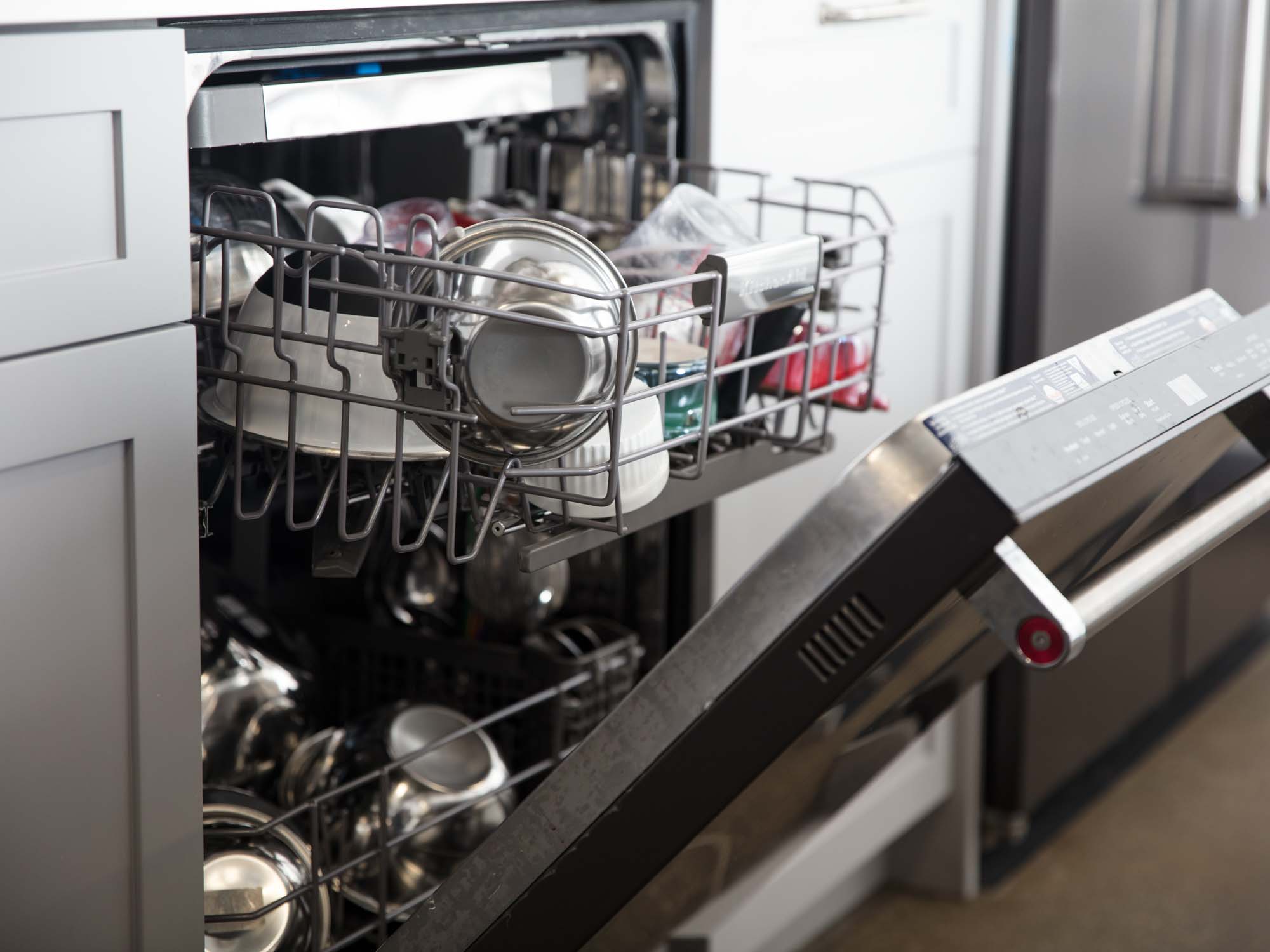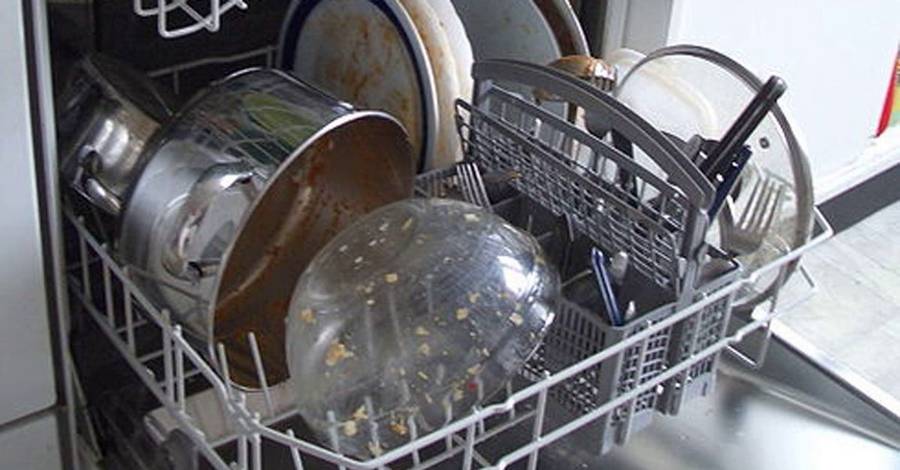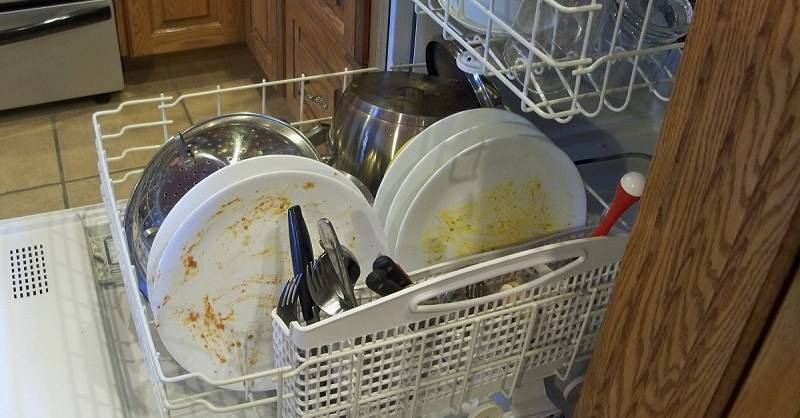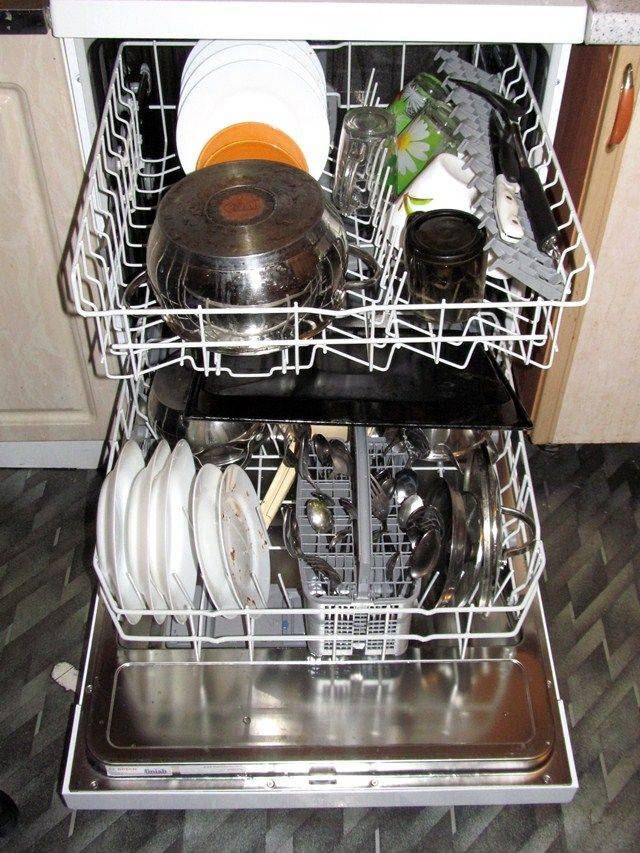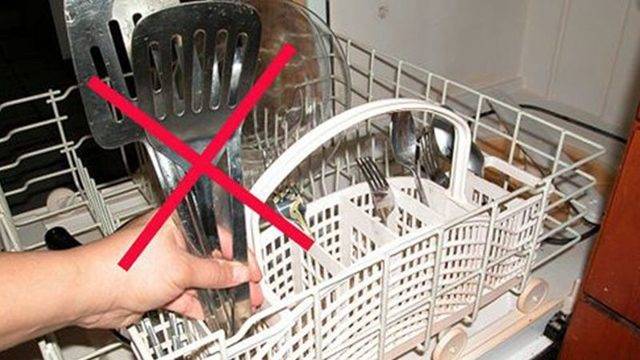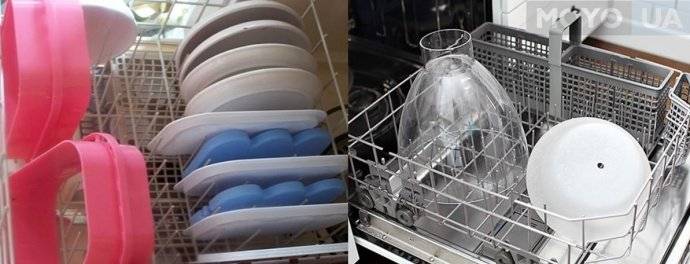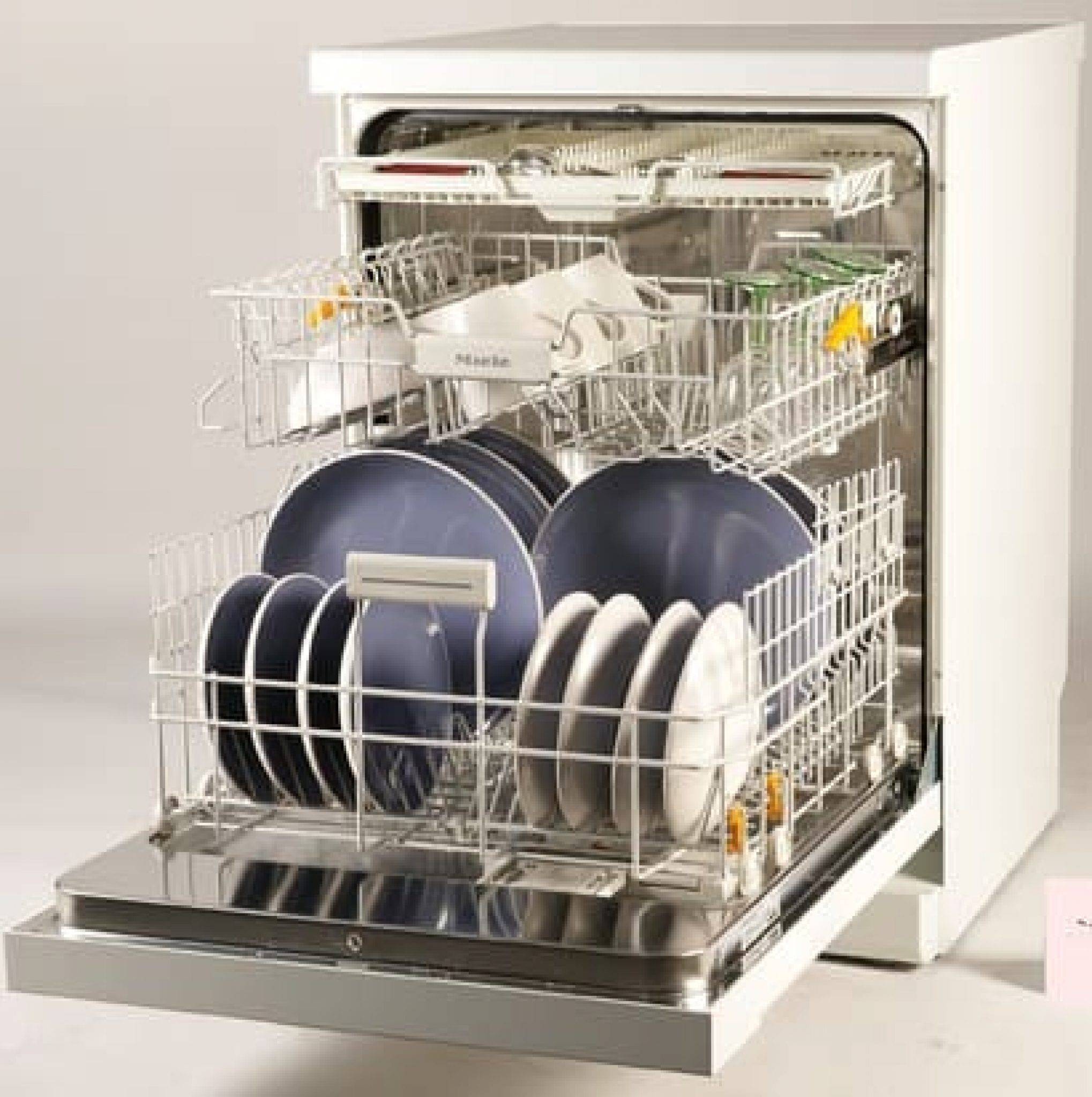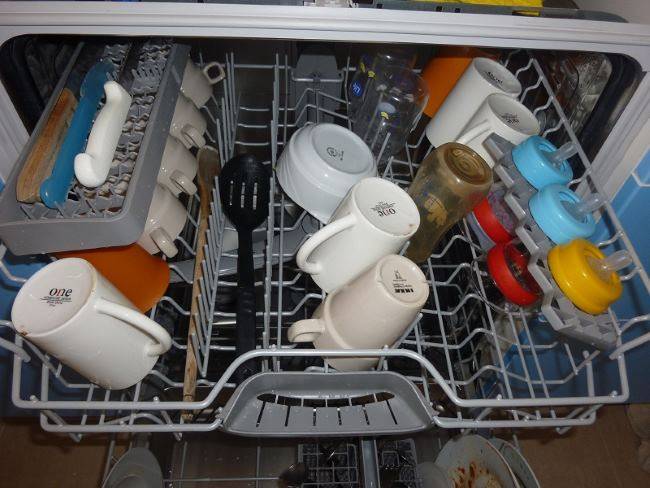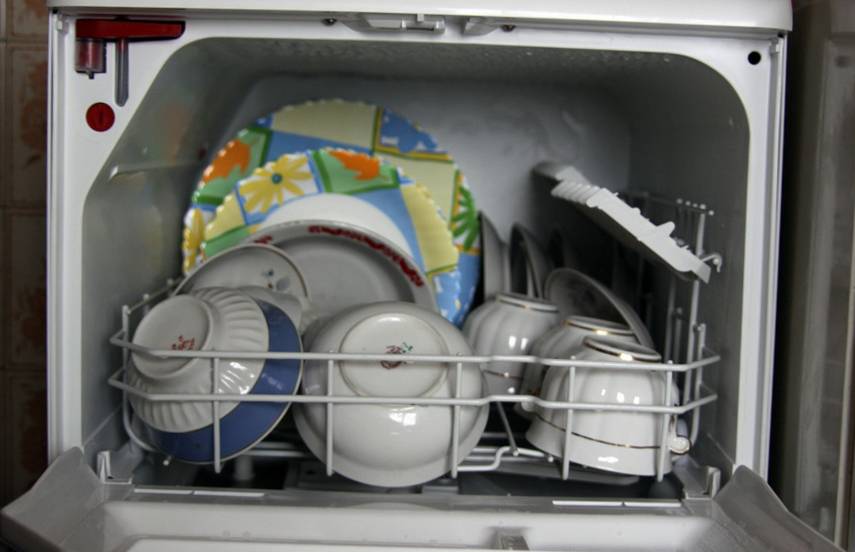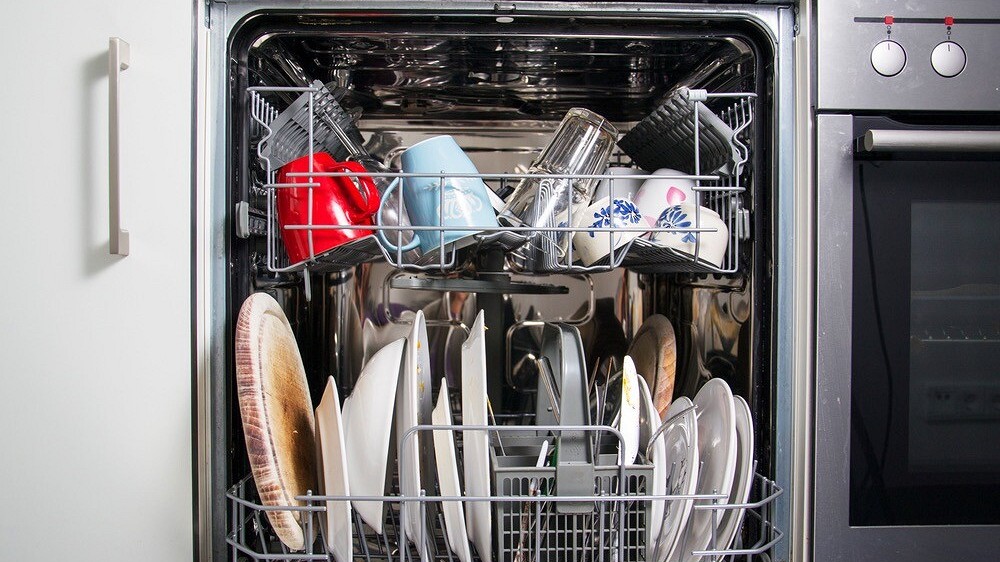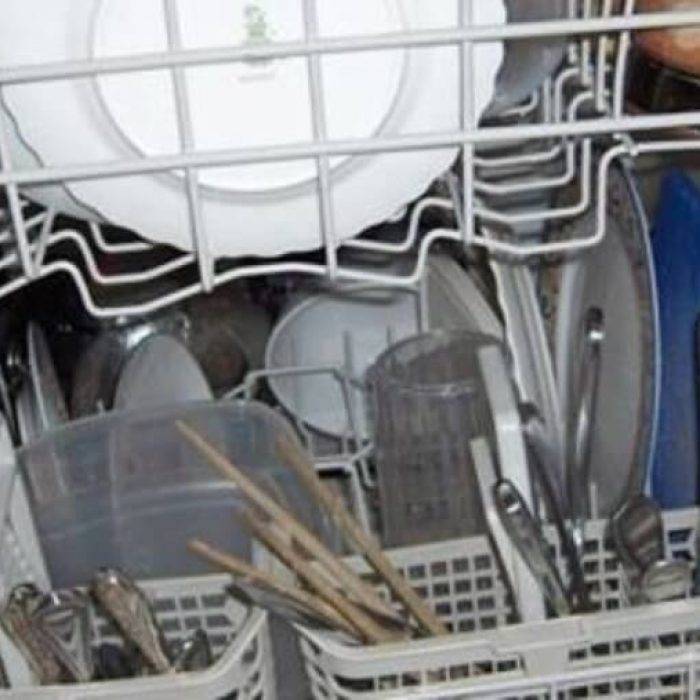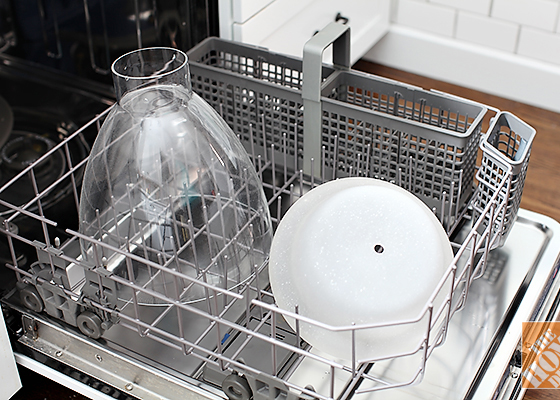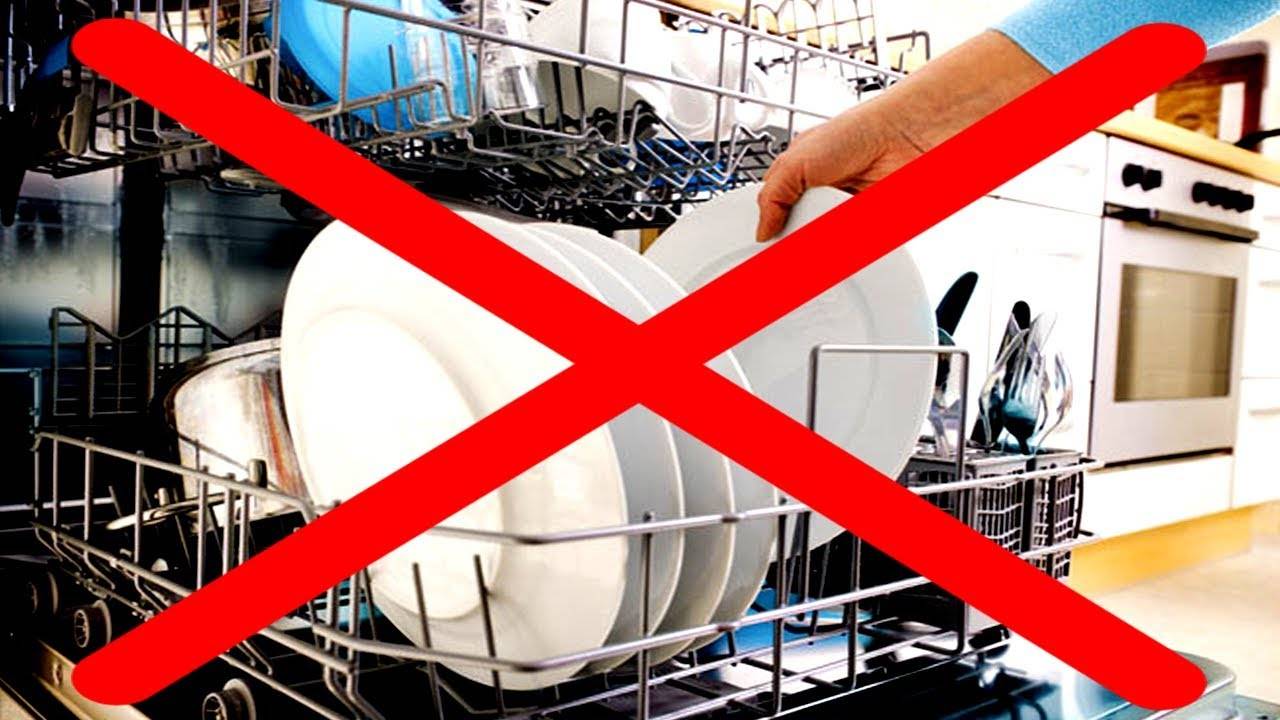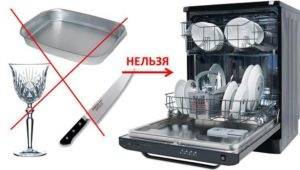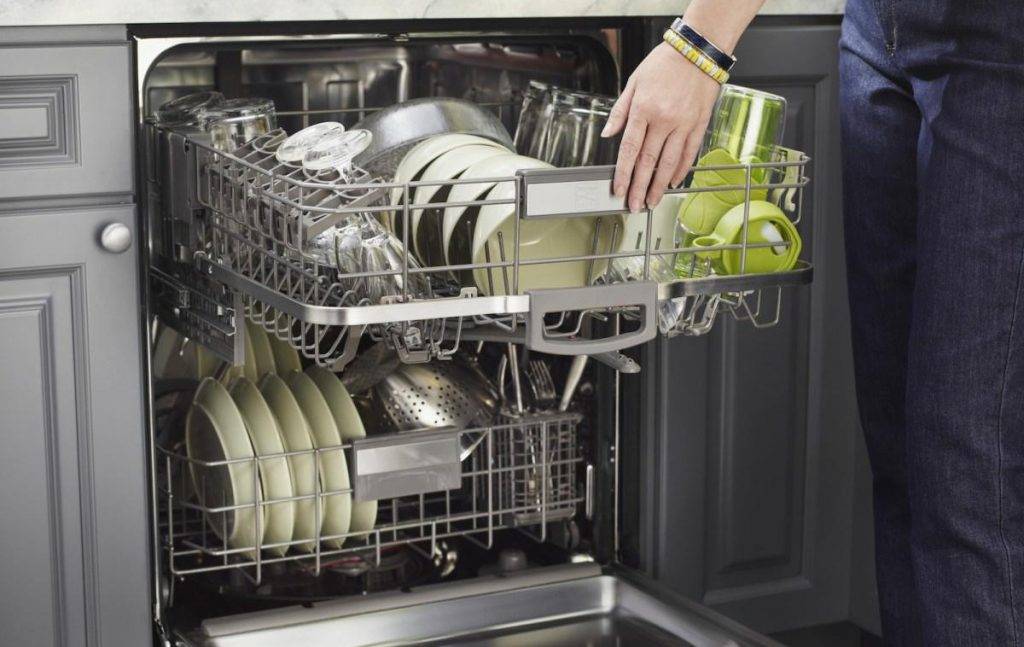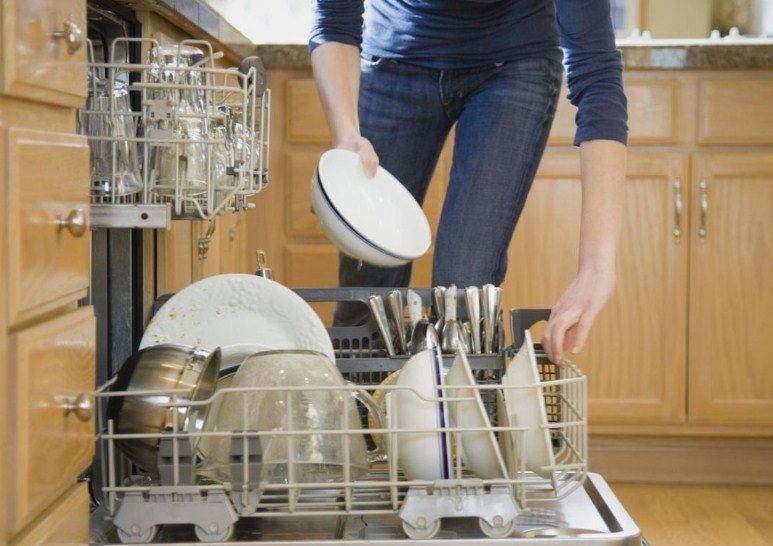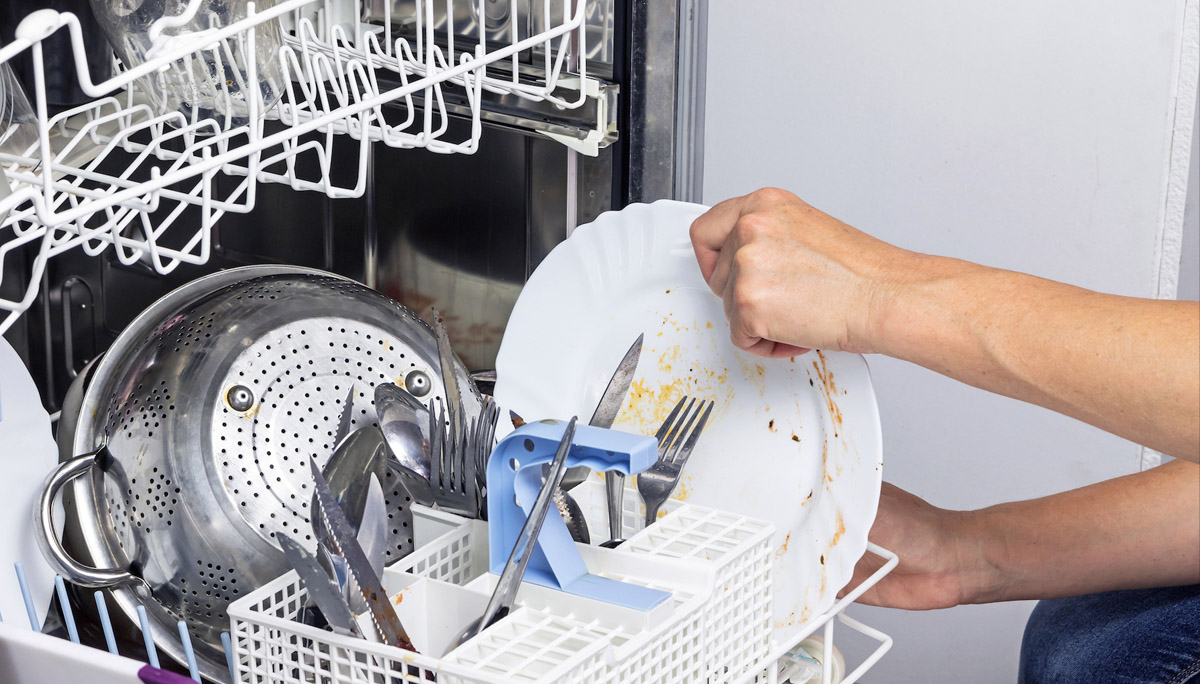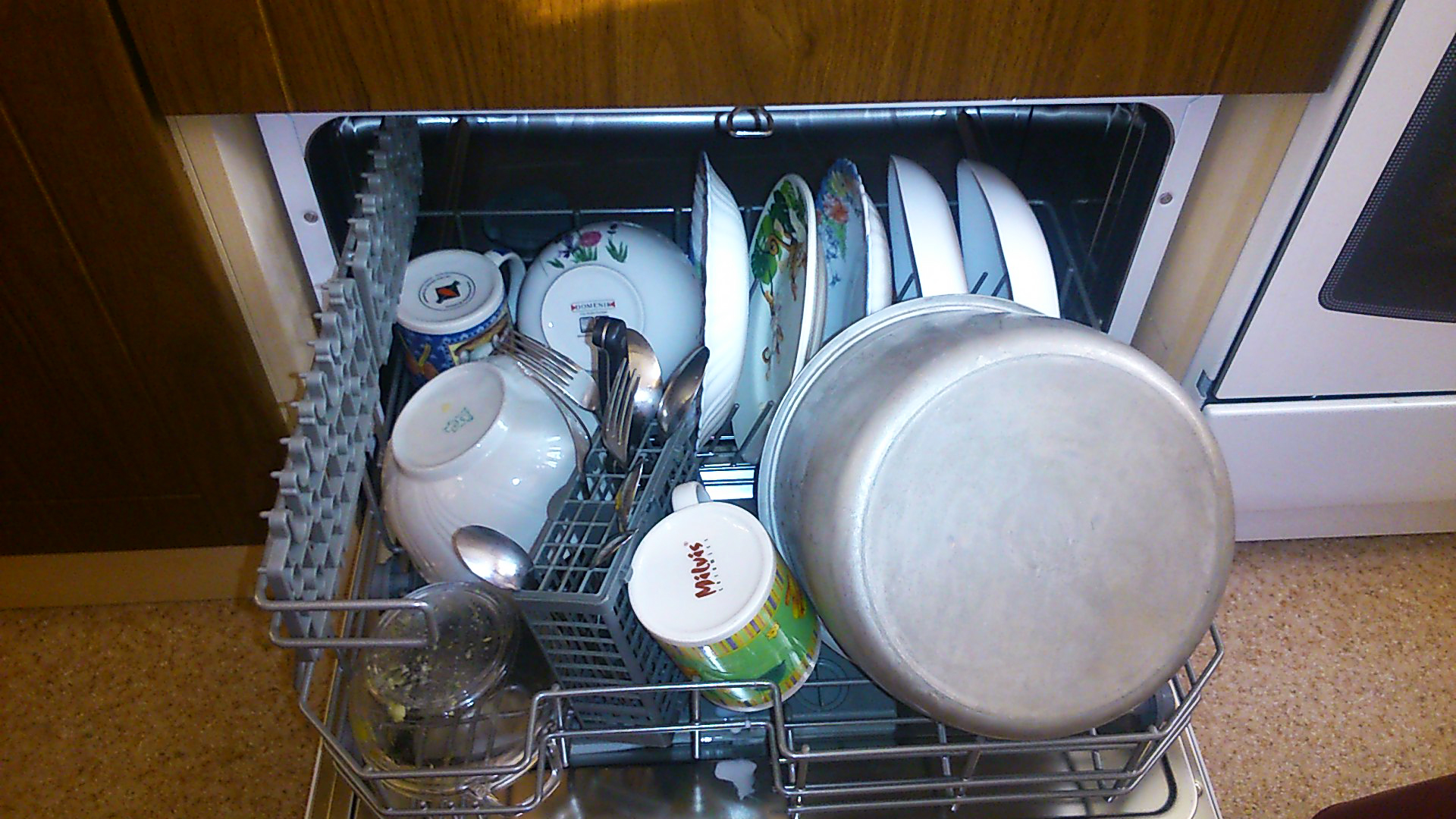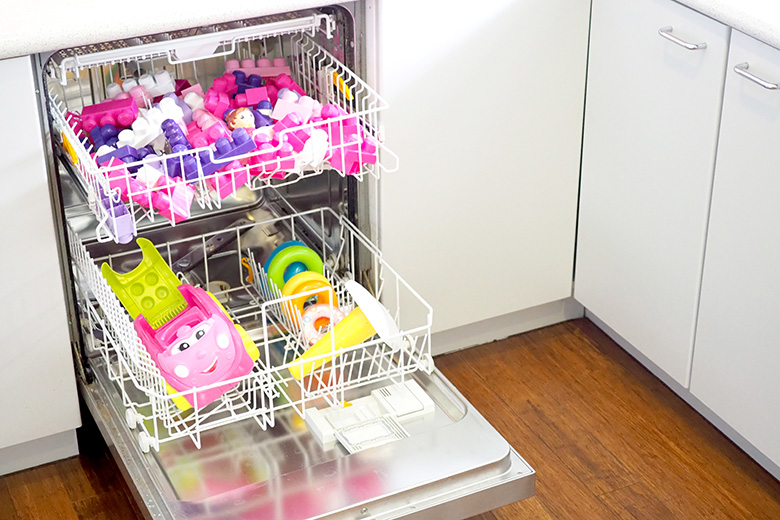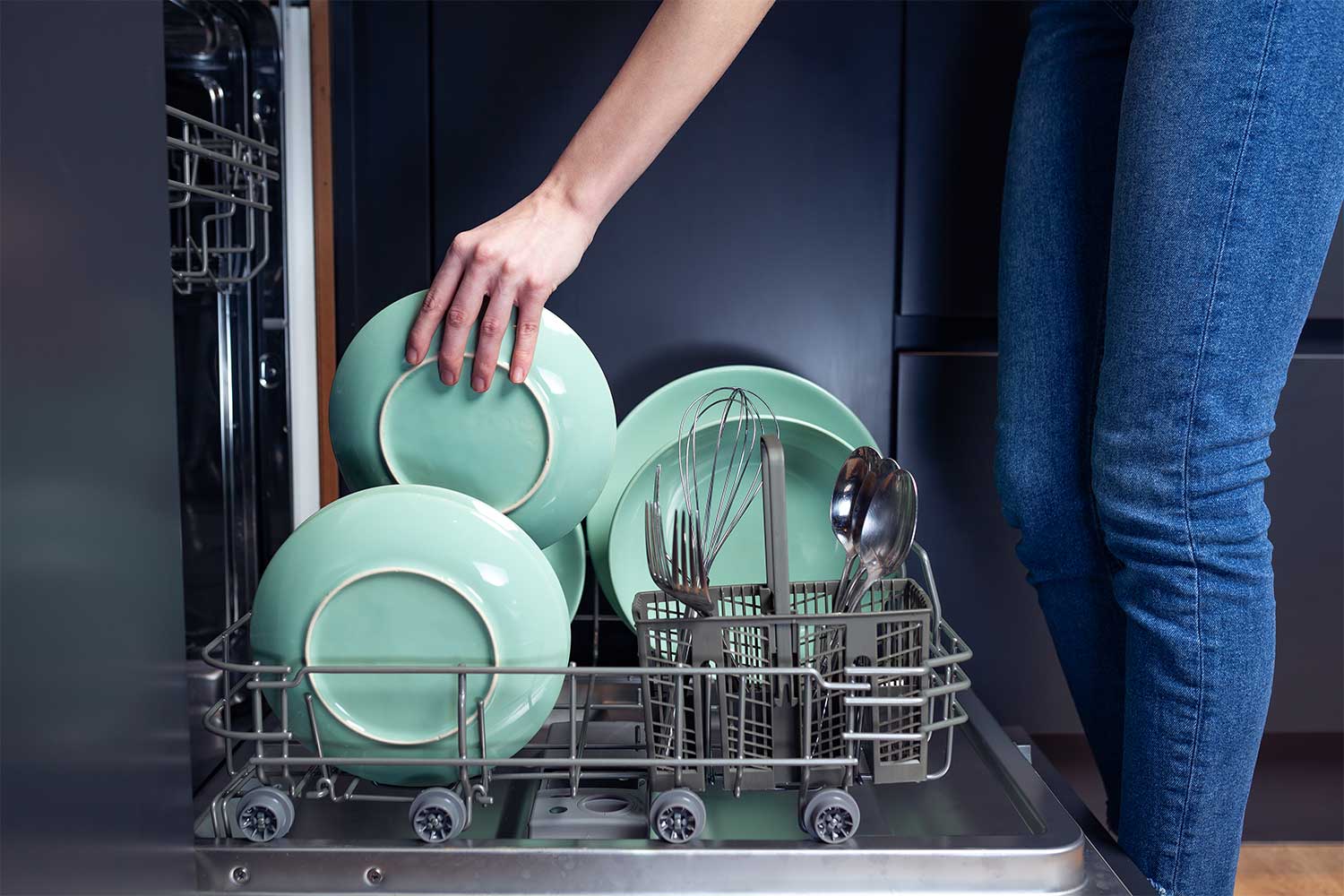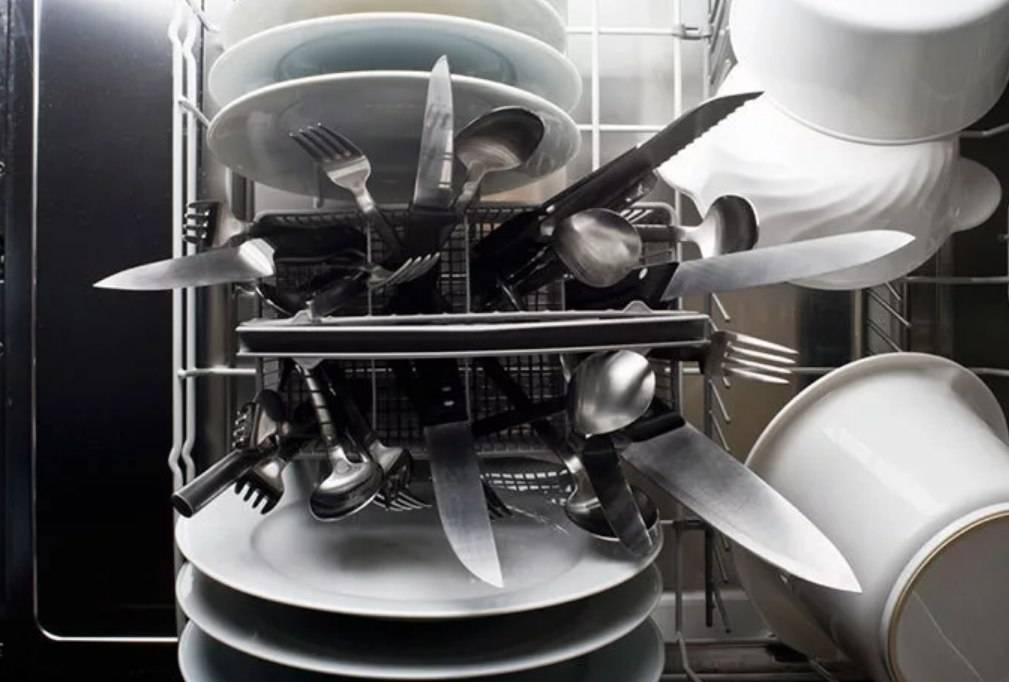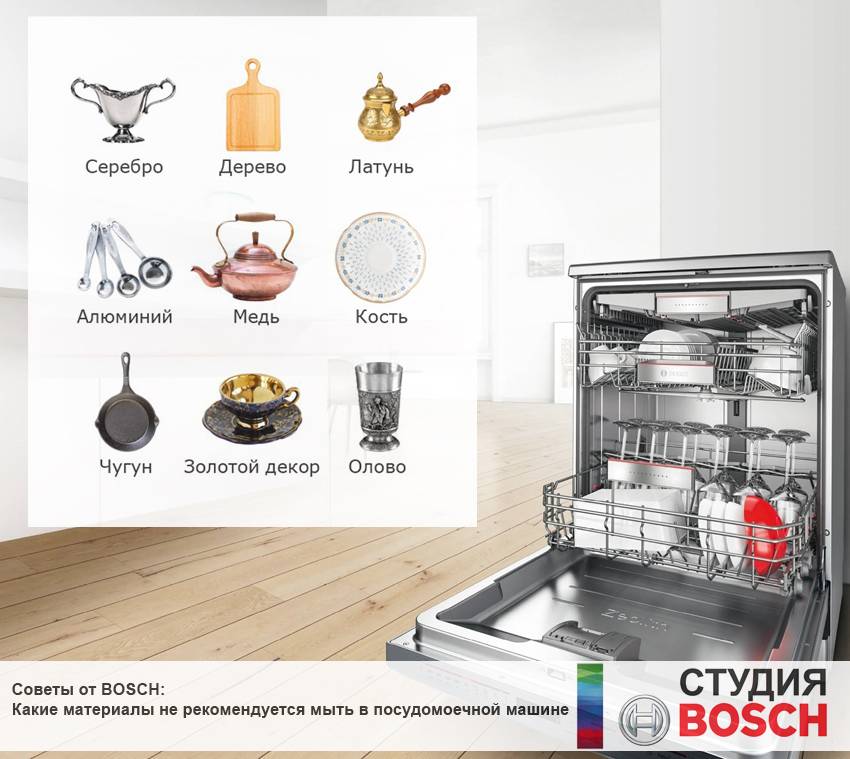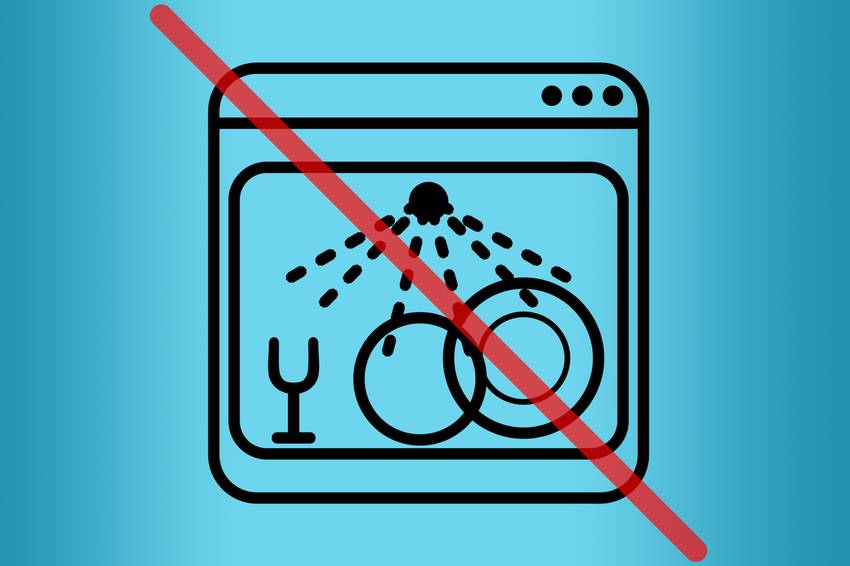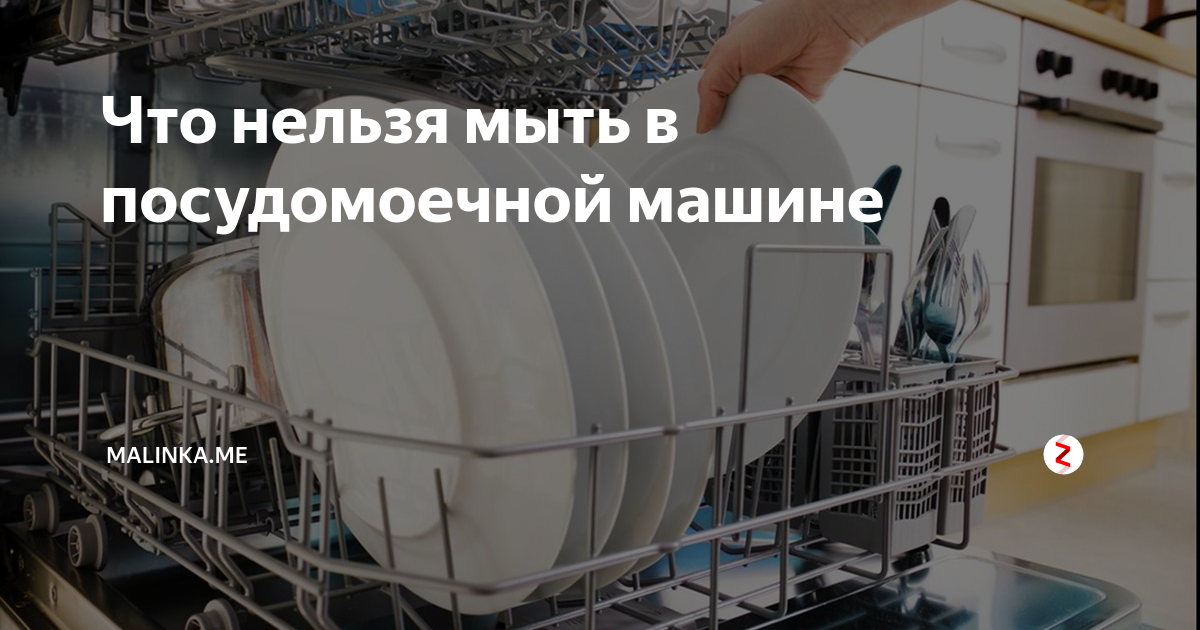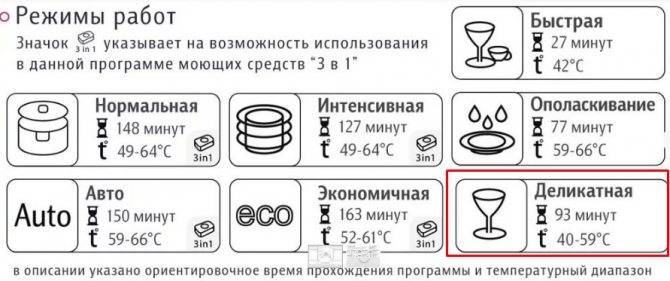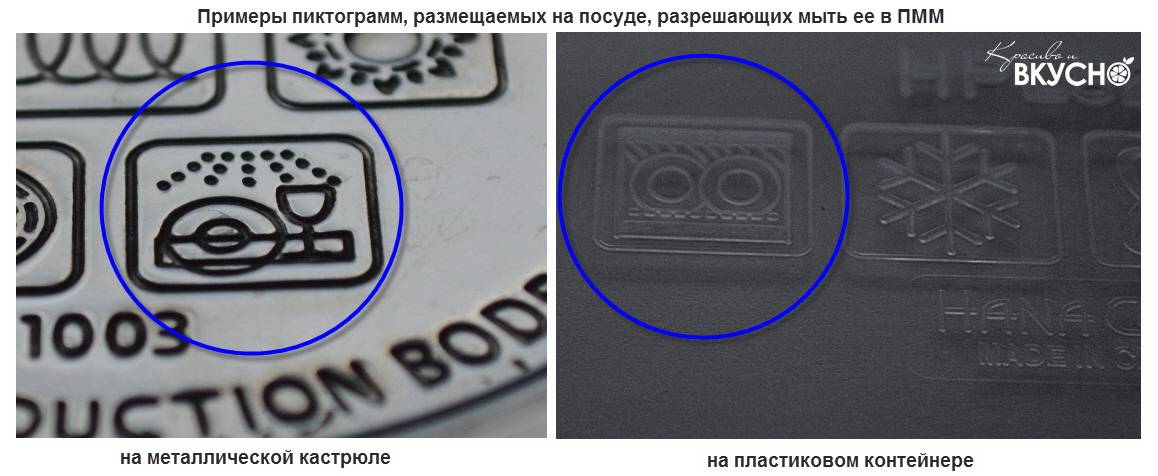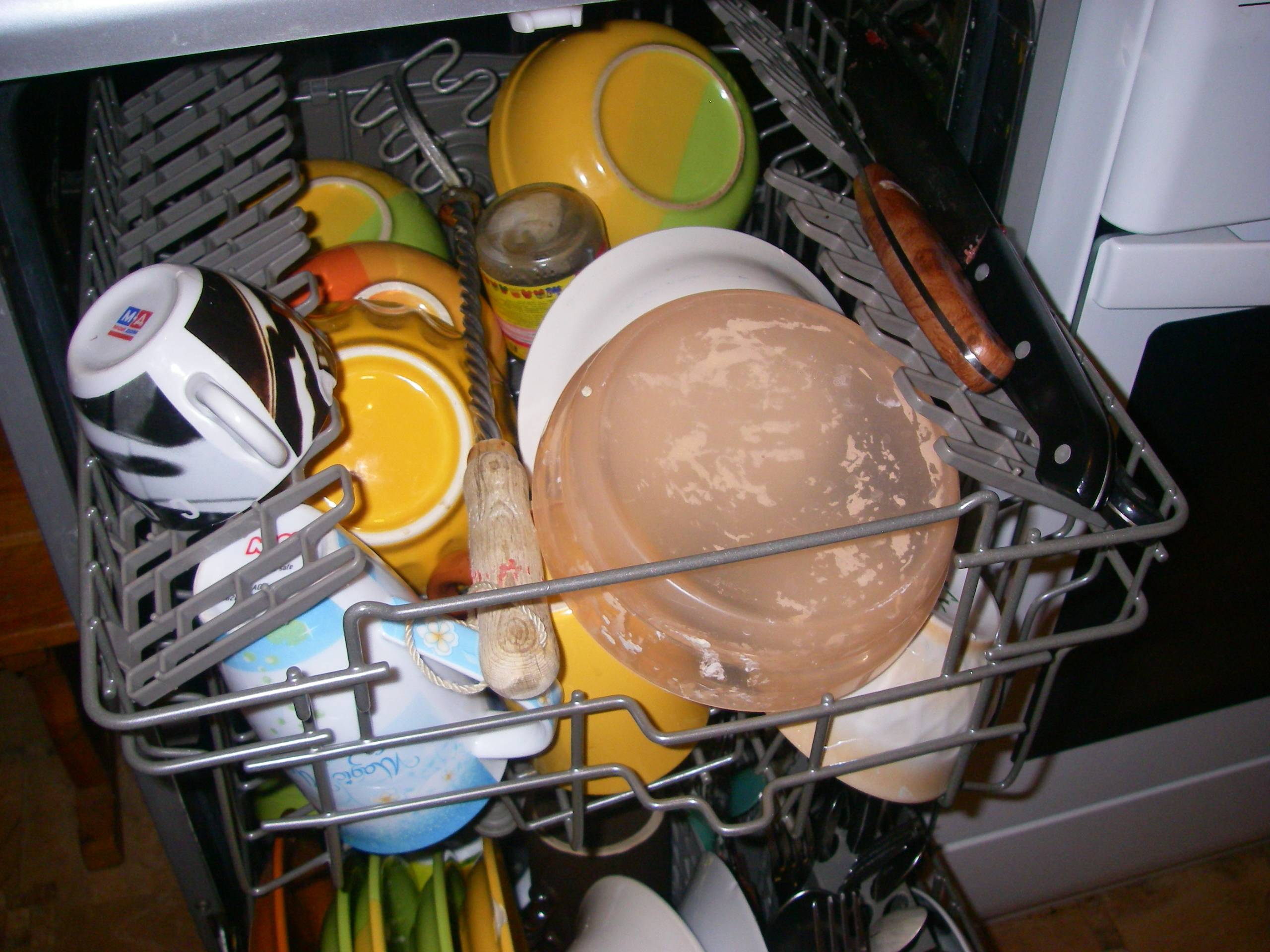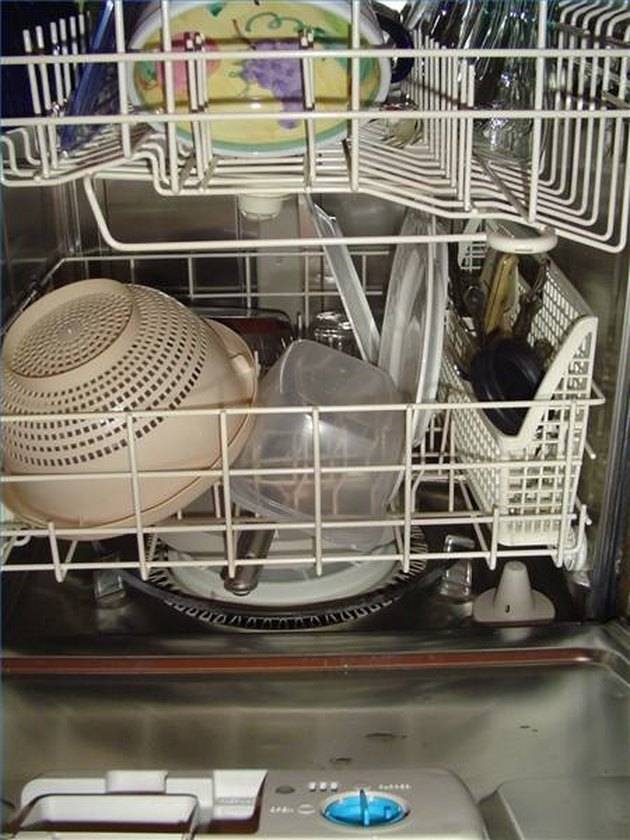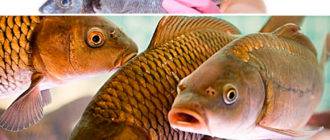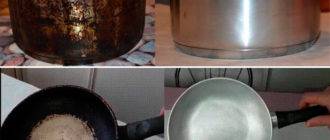What can be washed in PMM under certain conditions
There is a group of cutlery that can be washed in a dishwasher at a certain temperature, choosing the right product and neighborhood. For example:
Cupronickel is an alloy from which exquisite spoons and forks are made, reminiscent of table silver.
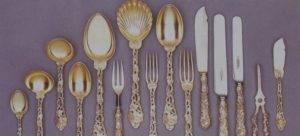
Cupronickel devices should not be placed in the chamber with other metal objects, as this oxidizes and darkens them. If there are decorative elements made of other materials on the handles, it is better to wash the set by hand. Also, carefully read the instructions of the detergent - whether it is compatible with cupronickel.
Porcelain is a delicate, delicate and expensive material. Manufacturers of Japanese and Chinese porcelain do not recommend machine washing, but experienced housewives have come up with a safe way to wash the dinner service in the PMM:
- Choose a temperature regime no higher than 55 degrees - high temperatures have a bad effect on porcelain.
- Do not use aggressive detergents.
- Use only the top of the basket for loading.
- Cups, saucers and other items must not touch each other.
- Do not wash porcelain at the same time as other materials.
- Porcelain with gilding, glaze has no place in PMM.
By observing these points, you can easily get a clean and whole service.
- Thermos. Dishwashers, hot water, high pressure - can ruin the thermos, damaging the flask. Therefore, if you choose a low-temperature cycle, a delicate, liquid agent, you can successfully wash a thermos, thermo mug.
- Toys for kids. Many mums use a dishwasher to clean and disinfect children's toys. You can wash toys made of durable, high-quality plastic, without small detachable parts, rubber, silicone. It is not advisable to wash dolls with artificial hair - the hairstyle after such a "shower" cannot be saved.
- Zepter brand.

Cookware "Zepter" is a popular, high-quality cookware equipped with high technologies. Made from durable alloys and heat-resistant glass that can withstand dishwasher maintenance. But some technical elements (for example, the thermocontroller on the lid) can be damaged during washing. Therefore, before loading into the hopper, such parts must be unscrewed.
Teflon pans, saucepans, pots. If we are talking about the original Teflon trademark, then the manufacturer gives the go-ahead for automated maintenance of Teflon products. But quite often sellers call any non-stick coating Teflon. Therefore, before loading the dishes, read the instructions, look for permissive or prohibiting markings. If there is a "can be washed" icon - feel free to load the devices and start the cycle. The symbols on the dishes will help determine the correct use, care, storage.
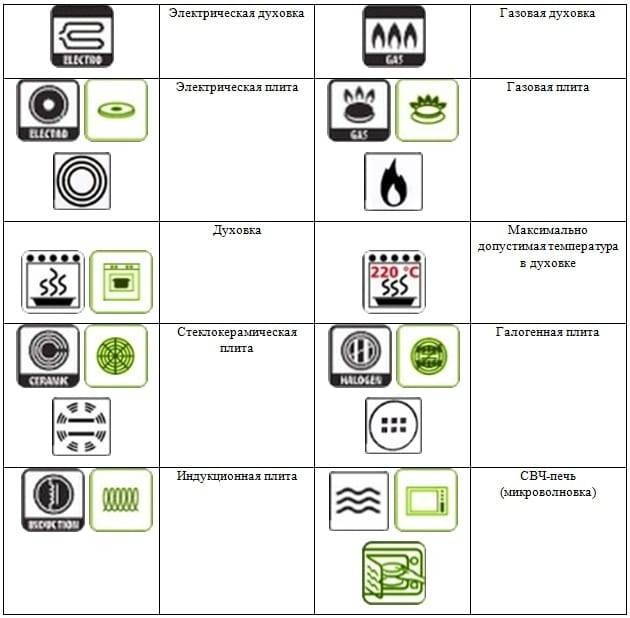
- Knives. If the dishwasher is equipped with a special compartment for knives, they can be washed without problems. Otherwise, sharp blades damage the metal of the grille, become dull, and wooden handles deteriorate.
- Baking trays - can be washed in the lower compartment, if it fits in size, you must first remove burnt food debris, fat so that the pumps do not clog.
- Cast iron, cast iron grates. Cast iron products deteriorate from aggressive detergents, high temperatures, prolonged exposure to water. Subject cast iron to such a test as a last resort, choosing the shortest mode, low water temperature, without detergent. This also applies to grill grates if they are not made of aluminum. Aluminum deteriorates in a typewriter.
- Filter jug. Jug "Barrier", "Aquaphor", others can be washed in PMM at a temperature of no more than 40 degrees.
- Exhaust filter. The choice of cleaning method depends on the material from which the hood mesh is made.If it is aluminum or aluminum alloy, choose manual care, otherwise the filter will turn black and deform.
- Refrigerator shelves. Shelves made of dense plastic can be freshened at a low temperature, without abrasive detergents - otherwise the material will be scratched.
- Plastic containers - if there is a sign permitting such a method.
What is the benefit?
Many opponents of dishwashers believe that it requires a lot of electricity, water and detergents. At the same time, supporters of automatic home assistants in the house argue that the technique significantly saves not only the time of the hostess, but also her strength. In addition, the resources expended are not that great compared to hand washing kitchen utensils. However, before buying, you need to make an informed decision. Someone believes that there is no need for a family of two to acquire PMM, while others argue the opposite. In this case, the following reasons are given:
- During dinner, only two plates are accumulated for the second course, a couple of salad bowls and glasses of coffee and tea. Such a set of dishes is easy enough to quickly wash with your own hands.
- However, dishwasher adherents are making adjustments to this situation. In addition to plates and cups, it is necessary to add to the list the pots and pans in which the hostess prepared dinner. In addition, guests may unexpectedly come, so the volume of the dishes is significantly increased.

1 What metals "don't like" a car wash?
Dishwasher treatment can be detrimental to some metal surfaces. Therefore, the following products must not be machine washed:
- Cast iron pots and pans, grates. After being washed in the car, they start to rust. Cast iron cookware has a thin film of fat that forms after the first cooking. It acts as a barrier that prevents moisture from penetrating to the material. It breaks down in the dishwasher, so the pans lose their corrosion protection. If the cast iron is enameled, then you can put it in the PMM.
- Aluminum cookware. An ugly white coating appears on it.
- Silver products. Dark spots appear on them due to the effect of substances that make up the PMM tablets.
- Meat grinder details: knives, nets. After washing, they may turn black due to oxidation. It will be possible to remove dark plaque only with the help of abrasive substances.
- Copper basins and teapots. In the dishwasher, the metal oxidizes and becomes covered with dark stains, which can only be removed by polishing.
What kind of dishes can be washed in the dishwasher
But not everything is so sad for the hostess. What kind of dishes can be washed in the dishwasher safely:
Ceramic set items (without decorative inserts). If there is a drawing on a ceramic plate that is made by firing, then there is nothing to be afraid of, it will not peel off. But if the ornament is applied over a burnt surface, then it will peel off in the dishwasher.
Food grade plastic dishes, food containers, silicone bakeware can be washed safely. They endure any test. A food container without a lid will wash well.
Items made of ordinary glass are easily tolerated by an automatic wash. Soviet "crystal" also easily withstands washing in a dishwasher
It is only important to make sure that the objects do not touch, otherwise there may be damage.
Cutlery stainless food grade steel easy to carry the sink. You can also wash cupronickel spoons and forks
They withstand both detergent and temperature.
You can wash porcelain without a pattern in the dishwasher. Porcelain without a pattern easily tolerates an automatic wash with detergent. If there is a drawing and it is under the glaze, then you can not worry about it either. If the drawing is made on top of the glaze (very rare), then you cannot wash it in the dishwasher. As a rule, the manufacturer of porcelain dishes affixes the desired icon on the bottom to determine whether or not it is possible.
Pans can only be washed with the corresponding icon.
Any enamelled dishes can be washed in the dishwasher. If we wash and clean such dishes by hand, there is a greater risk of erasing the enamel than in a PPM.
Stainless steel and cupronickel dishes are allowed to be washed. Cupronickel washes well in a PPM.
What can not be put
Not all cookware can be placed in the dishwasher. A unit that is misused will quickly deteriorate. Not to mention the spoiled items.
Aluminum, silver and copper cookware
Aluminum is one of those materials that darken after being exposed to hot water and powder. A disposable sink will not spoil the look of your pot or cutlery. But after 3-4 washes, you will have to clean the plaque with other means.
Wooden and cast iron items
Wood products tend to swell in hot water. A long stay in the dishwasher ends with cracks for cutting boards, rolling pins, wooden spoons. They will have to be discarded after washing in the machine.
The cast iron cauldron cannot be washed in a household machine. After prolonged exposure to hot water and aggressive detergent, the cast iron will corrode. Over time, problem areas will begin to increase, and you will have to part with the dishes.
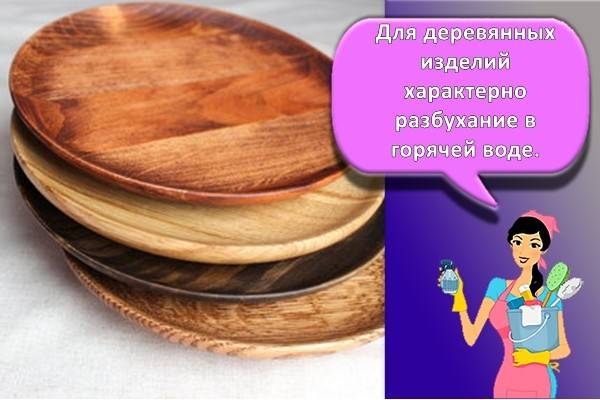
Knives, strainers and garlic presses
The sharpness of the knife decreases after washing it in hot water. Appliances with glued handles do not tolerate soaking. The same applies to the horn and bone handles of knives.
Strainers can scratch glass and stainless steel surfaces. Do not put in the PMM and garlic press, as it is usually made of aluminum or copper.
Thermos and crystal products
When buying a thermos or thermo mugs, pay attention to whether they can be washed in the machine. If not, then it is better to rinse the devices by hand.
Teflon coating
Do not overheat teflon-coated dishes. Detergent will damage the coating. After that, it will be impossible to use an expensive device.
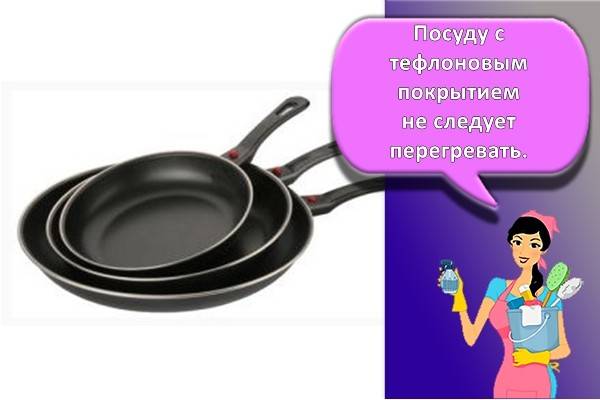
Multicooker cups
High temperatures inside the PMM negatively affect the non-stick properties of the multicooker bowl
After washing in the unit, use the appliance for cooking several times with care.
Utensils with decorative elements
Increased sensitivity to external influences of unique porcelain and glass products will lead to their loss. Often cracks appear on surfaces and decorations from heating, which will ruin the appearance of the decorative product.
4 Useful tips
There are situations when the manufacturer allows you to wash dishes or parts of household appliances in a dishwasher, but in some cases, you should prefer hand washing. It does not always make sense to wash the following items in the PMM:
Teapots. If it has too narrow a hole for water inlet, then during washing, water will not be able to penetrate inside, and it will not be washed off. Kettles with limescale deposits should not be put into the dishwasher at all. Detergents are absorbed into limescale deposits. It will not be possible to boil water in the kettle until all the scale has been removed.
The meat grinder has many curved surfaces, and the PMM is unlikely to be able to completely wash them.
It is also important that many users note the blackening of parts after processing them in the dishwasher. If, nevertheless, it was decided to wash the meat grinder in this way, at the end of the procedure, it is necessary to check whether all the areas have been washed, and, if necessary, wash the device with your hands.
What materials cannot be put in the dishwasher
Since detergents for cars are much more aggressive than for hand washing, and the water temperature reaches 90 degrees, porous, fragile and easily rusting objects should not be put into the device.
Which pots cannot be washed in the dishwasher:
- Salad bowls and soup bowls in the form of pots (made of thin porcelain or glass, majolica, using the Gzhel technique, Khokhloma, etc.). Fragile materials from vibrations and too hot water quickly crack, become cloudy or lose their glaze.
- Clay and ceramic pans for baking, but without glaze - these materials absorb the detergent intensively and are reluctant to release it when rinsing, so that the dishes will be toxic at the exit.
- Pots with Teflon, ceramic and other non-stick coatings without a special protective layer - after a few washes, such pots will “peel off” to an aluminum or steel base and lose their key properties. Bowls from a multicooker fall into this category - they are shown only manual care.
- Aluminum - usually dishwasher cleaning is a disaster for them. The detergent strips off the protective oxide film, the metal reacts with water. As a result - darkening and unsuitability for food purposes.
- Cast iron cauldrons and pans - these dishes are too heavy and easily injure the fasteners, but the main thing is that the material rusts from prolonged humidity, and in the dishwasher, the bookmark usually remains until morning.
- Any with wood or plastic handles that are not designed for high heat.
A separate word about enameled dishes. If it is iron and chipped, it will rust in the dishwasher. If the enamel is old or cheap, it will crack quickly. But expensive, high-quality enamel over cast iron is one of the best solutions. It does not peel off and does not allow the metal to oxidize. The only limitation is weight. A small pot of 2 liters can still be put in the tray, but a 5-liter cauldron is not worth it.
Which pots can be washed in the dishwasher without restrictions:
- made of stainless steel;
- small cast iron with high quality enamel;
- glass for baking and microwave (designed for high temperatures);
- modern (and usually not cheap) pans with a protective layer over ceramics or a non-stick coating, preferably steel rather than aluminum in the base.
Dishwasher-safe conditions
In the home kitchen, you have to constantly wash not only dishes and cutlery, but also a variety of cooking utensils. Forks, spoons, plates, glasses, cups, knives, cutting boards, pots, pans, etc. There is a huge amount of kitchen “utensils” in the arsenal of any housewife. And all this gets dirty on a regular basis and requires washing.
To understand what is not worth putting in the PMM, you just need to imagine the conditions within this technique after switching on. To wash kitchen utensils in the dishwasher, rather aggressive detergent chemicals are used, coupled with hot water. Not every material is able to withstand this without serious negative consequences.
If you put in the dishwasher objects that are not allowed for washing in it, then as a consequence, you can get damage to this utensil and breakdown of the PMM itself - you cannot use the dishwasher for other purposes.
In general, four factors act on the dishes placed inside the PMM:
- Aggressive detergents.
- Water with temperatures up to + 50-75C.
- Prolonged exposure to moisture (in some modes, the "wet-wash-rinse" cycle can last up to 4 hours).
- Hot air drying.
The utensils washed in an automatic dishwasher must calmly withstand the effects of all these factors. Some materials are not afraid of high temperatures, but household chemicals are harmful to them. And others simply swell from a long stay in water. It is necessary to take into account everything that happens inside the PMM with cutlery, in the complex.
Some of the dishes are now marked with special marks "can" and "must not" be washed in the dishwasher, but not all manufacturers do this.
Plus, in any kitchen there is a lot of old cutlery, on which there were no such marks initially. In Soviet times, no one even thought about the need for such a marking. PMM was then used only in large canteens. And there they knew which dishes should be washed from food residues in an automatic dishwasher, and which not.
Why can not be subjected to automatic washing
Tableware with a decal and gilded edges is coated with a delicate golden or silver composition that gives them a spectacular appearance.A thin layer of gilding on glass or porcelain is especially sensitive to temperature influences.
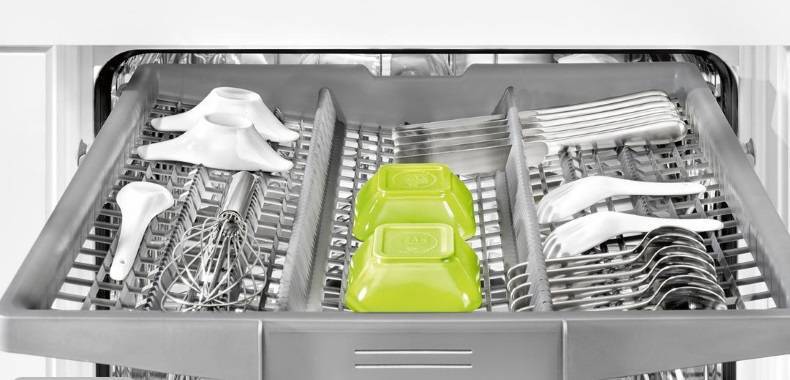
In the dishwasher, the removal of dirt from the surface of plates, glasses and other kitchen utensils is carried out using hot water and exposure to high temperatures. All this will ruin the gilded sets. Such dishes are expensive and require careful hand washing.
In addition to gilded dishes, there are many kitchen utensils that should not be sent to the dishwasher, since after such a procedure they will deteriorate and lose not only their original appearance, but also their functionality.
Before using such household appliances, you should carefully read the instructions for them. This will help to avoid material losses in the form of spoiled kitchen utensils.
A short guide
In conclusion, we will briefly answer the most frequently asked questions on the popular topic "is it dishwasher safe": questions
selected by frequency of mention in search engines, so the list is, of course, not complete. Sorted alphabetically.
| Aluminum | Strongly "no" - the coating will peel off, the dishes will be covered with a disgusting dark gray bloom |
| Bamboo | This is an ordinary tree, so it is not worth it |
| Banks | Glass, of course, can be washed, but there should be no stickers on the jars; or then rinse the nozzles thoroughly sprays and clean the drain filter from paper debris. |
| Blender | The same fate can befall him as a meat grinder: the coating will come off |
| Hood | Your desire is clear: it is impossible to wash the hood grates by hand. But, most likely, it is with some kind of coating, which will peel off in the dishwasher. |
| Clay | Not worth it for the same reason: it will crack |
| Wood | Better not: it will swell, crack. However, if we are talking about not the most valuable "consumables" like a cutting boards - please. |
| Toys | Plastic - not recommended, with glued parts - no, of course. |
| Pans | Depends on the material and coating: stainless steel - no problem, with the rest you need to be more careful and study icons on dishes |
| Ceramics | Not recommended: may crack from temperature changes |
| Containers | Not worth it, especially if they are thin-walled: they can warp. If it is made of heat-resistant plastic, please. |
| Bone | We advise against: may crack |
| Cupronickel | It may darken from exposure to chemistry, however, it darkens anyway. Here the opinions of the hostesses were divided: those who regularly cleans cupronickel dishes, does not see anything wrong with washing them in the dishwasher |
| Multicooker | Depends on the material of the bowl: if the bowl is made of aluminum - no, with a non-stick coating - it is better to look for a permissive icon. As for other parts of the multicooker, do not put plastic and rubber in the dishwasher. details. |
| Meat grinder | No: modern meat grinders are usually chrome-plated and guaranteed to peel off |
| Stainless steel | No problem! |
| Knives | It is better to avoid: firstly, they are too sharp and can damage the parts of the machine, and secondly, hot water will blunt them. |
| Plastic | Thin - no (disposable dishes, containers), with a sharp "chemical" smell - definitely "no". Can be washed exactly dishes made of heat-resistant plastic, the rest of the dishes need to study the icons. |
| Shelves | If they are with metal parts, then a categorical "no" - the coating will come off |
| Baking tray | It depends on what it is made of: it may suffer from non-stick coating over time. But here it is more important to resolve the issue with a PMM capacity: not all will fit a large baking sheet. |
| Silver | It is better not to risk expensive dishes: silver is a soft metal, and may not withstand washing conditions, especially when the presence of a subtle pattern. |
| Silicone | It withstands dishwasher conditions well, but some housewives complain that the pastries then hardly stick off |
| Pans | Basically it is possible, but there are restrictions: it is definitely impossible to aluminum (the coating will peel off), undesirable cast-iron (starts to rust), Teflon is questionable (coating may suffer) |
| Grater | We do not recommend: firstly, it has sharp edges and they can damage machine parts, and secondly, many of them are coated, which can peel off, thirdly, numerous food residues will clog the nozzles of the spray nozzles and the drain filter, and, most most importantly, the dishwasher will still not wash the food out of the small holes. |
| Thermo mug | Like any other vacuum object, it is not worth it, since you can damage the gaskets, this very vacuum and creating |
| Thermos | It is not worth the risk, otherwise the insulating gaskets may suffer, and the thermos will become bad at keeping heat |
| Tefal | In principle, it is possible, but the coating may suffer: see the icons on the dishes |
| Porcelain | We do not recommend it: it is too delicate, and the gilding and painting can fade noticeably |
| Faience | Like porcelain, we do not recommend |
| Crystal | It is better not to wash: it can become cloudy and become covered with microcracks |
| Cast iron | Cast iron cookware can start to rust |
| Enamel | It is possible, but with reservations: the washing temperature should not be too high and it is better to fill in the detergents softer. Do not forget also that the painting on dishes will suffer over time under any washing modes. |
What is allowed to be washed?
Having understood that it is impossible to wash in a dishwasher, it is necessary to decide what is allowed to wash in it. Based on this, it is advisable in the future to use mainly dishes from this list so that the dishwasher does not stand idle most of the time.
Earlier it was said about crystal. But around almost everyone is washing wine glasses, wine glasses, glasses, glasses made of this glass in the car. So is crystal glass dishwasher safe? Mostly yes. The prohibition applies only to thin crystal. In this case, it will not be superfluous to familiarize yourself with the pictograms on the packaging and find a permitting icon there. If the box has not existed for a long time, then evaluate the quality of manufacture on our own and make an appropriate decision.
Stainless steel is absolutely indifferent to detergent and temperatures, therefore dishes made of it can be used in the machine without restrictions.
Ceramic products. Apart from special modern dishes made from the calculation of washing in the machine, ceramics are better than all other materials to withstand the harsh conditions of the machine. The only thing that needs to be done is to make sure that the plates do not touch each other.
Plastic dishes. Today, it is she who occupies the lion's share of all the dishes in the kitchen. These can be plates, mugs, containers, forms. You can think of a material like plastic in different ways, but it is just perfect for washing in a car. Perfectly withstanding temperature and chemistry, such dishes will also remain unharmed by shock and contact.
Baby bottles made of plastic, and these are the majority today, can be washed under one condition. It is necessary to take into account the fact that these are children's dishes. This means that she should wash with minimal use of chemicals. This can be achieved either simply without adding a product, or using a special product designed for children's dishes.
It is also allowed to wash the pans in the dishwasher. It is them that most often you do not want to wash with your hands. However, it is better to make sure that there is a corresponding pictogram on the packaging of the pan. And it is better to rinse a frying pan that is too greasy in the sink beforehand, as the fat adversely affects the filter of the machine.
Reasons why you shouldn't put aluminum in PMM
Aluminum is a fairly active metal that reacts with many substances and even with water, under certain conditions. These conditions are created inside the dishwasher. There is a dense oxide film on the surface of this metal, which dissolves well with alkalis. In the composition of many detergents for dishwashers, alkalis are present, thanks to which the dishes are washed without physical impact.
So, under the action of alkali in hot water, an oxide film is removed from the surface of aluminum dishes.As a result, aluminum gets the opportunity to react with water, which leads to the destruction of aluminum itself and the appearance of a dark coating on its surface. If you expose dishes to such an effect for a long time, then it will not only be dark, but also begin to deteriorate. Some note that after washing the dishes at 35 degrees, nothing happened at all, but we still warn you, after a few of these washes, the dishes will still darken and possibly forever.
Hand dishwashing detergents are less aggressive, so we don't notice any changes with aluminum cookware. However, with prolonged use, the darkening effect still appears. So, let's conclude aluminum cookware must not be placed in dishwasher because:
- it loses its appearance, acquiring a dark coating;
- it is not safe for health.
What to do with darkened dishes?
It's clear why it is forbidden to wash aluminum in the dishwasher. But after all, not many remember chemistry lessons, not everyone reads the instructions for dishwashers, and not all instructions contain a note that aluminum dishes cannot be washed, and some even accidentally put aluminum products in the tank. On thematic forums, users write about how they were spoiled: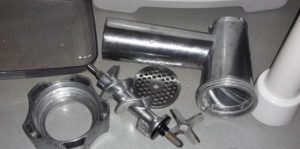
- pots;
- pans;
- garlic press;
- spoons;
- details from a meat grinder.
Therefore, the question arises, is it possible to return the former shine and attractiveness to aluminum cookware? Everything is not so simple and will depend on how much the dishes have darkened. The protective metal layer does not break down immediately, the hotter the water and the more alkali in the detergent, the faster the dishes will darken and become covered with a gray coating. Of course, the spoiled dishes should be thrown away, but sometimes this is not possible, especially if these are parts from a new meat grinder. How, then, to remove plaque?
Only manual cleaning with special means will help. But boiling with baking soda and powder will only aggravate the situation, so in no case do this. Nitric, sulfuric and other acids can help in the fight against dark gray bloom, but we will not describe this method, since it is not safe and can lead to irreversible consequences. Acetic and citric acid are unlikely to help, they are weak. Here are some things to try:
- cleaning and polishing with GOI paste for finishing polishing. It is necessary to apply the paste on a piece of felt cloth and rub the darkened product;
- polishing with a special French-made Dialux paste;
- treat the darkened products with the HORS rust converter for cars (use as a last resort), and then rub with one of the above agents.
What other dishes shouldn't be washed in the dishwasher?
Not only aluminum dishes can be spoiled in the dishwasher. And if in a number of cases such dishes can, and must be replaced, then you will not part with the other so easily.
Therefore, pay attention to what other products should not be washed in the dishwasher:
- dishes made of wood or with wooden parts - from a prolonged stay in water, such dishes will swell and crack;
- silver and cupronickel dishes - just like aluminum dishes, they can darken and lose their attractive appearance, which is not so easy to return;
- pans with Teflon coating, if there is no permission mark - during the washing process, unprotected Teflon becomes dull, which leads to food burning;
- knives - knives become very dull under the influence of hot water;
- bone and expensive china - may darken and lose luster.
The most important thing when washing dishes is to observe the temperature regime and the rules for arranging dishes. You can even ruin ordinary dishes if you wash them in too hot water and concentrated detergent.
So, aluminum cookware is the # 1 dishwasher ban.If you do not want to spoil the details of a new meat grinder or your favorite aluminum frying pan, then do not experiment with the advice of other users, they say, until you try it yourself, you will not find out. In this case, everything is clear enough without experiments, learn from other people's mistakes.
What's going on inside
All dishwashers operate according to a specific program. By pressing the button you can enable:
- water supply through the pump;
- heating it;
- washing under rotating jets of water;
- rinsing with a special composition.
Drying of the washed dishes also takes place inside. Up to 14 sets of dishes can be cleaned in the unit at one time.
Detergents
There is a container for detergent on the door of the household appliance. It is impossible to wash away dirt without using a powder or tablet. And the machine is set up to work with detergents. Without them, the device can automatically turn off. For each type of dishwasher, they produce their own products.
At the bottom of the apparatus there is a place for the regenerating sodium salt. It will help soften tap water and clean cutlery.
Water temperature
On the electronic control unit, sensors are responsible for the temperature of the water inside. A special meter supports the unit operation mode. In addition, the sensor ensures that the heating element does not overheat. Optimally, the water is heated to 50-60 degrees. Sensors also determine the hardness of water, the presence of impurities in it, even the temperature of the air in the kitchen.
Prolonged exposure to moisture
You can clean the dishes to a shine in only a few steps:
- First, objects are soaked so that dried dirt can be washed off.
- The cutlery is thoroughly washed with jets of hot water, which is supplied through the nozzles of the sprinklers.
- At the end, it is rinsed with clean water and dried.
The duration of the action of the water depends on the selected operating mode of the machine and the composition of the soiling of the dishes.
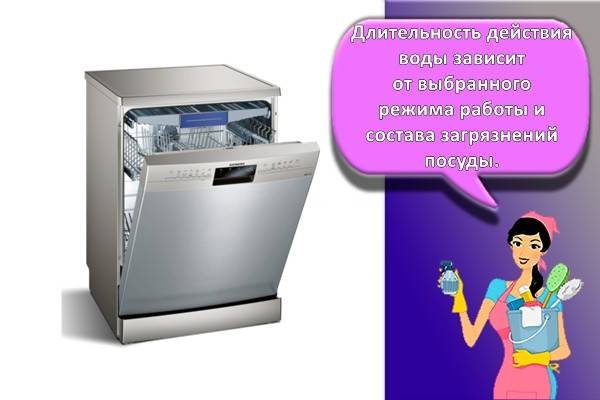
Hot air drying
The machine dries items using the built-in fan. Although the volatility of this method of processing washed dishes is noted, it proceeds quickly. More modern models are equipped with the mineral zeolite, which, when absorbed by water, releases dry heated air. This air flow serves to dry wet glasses and plates.

